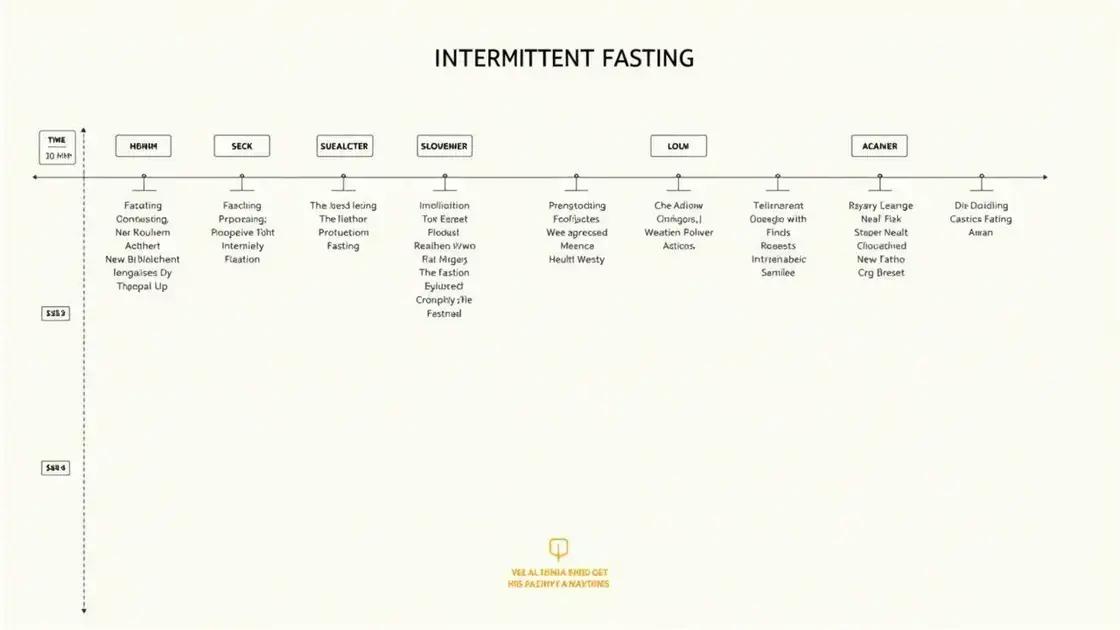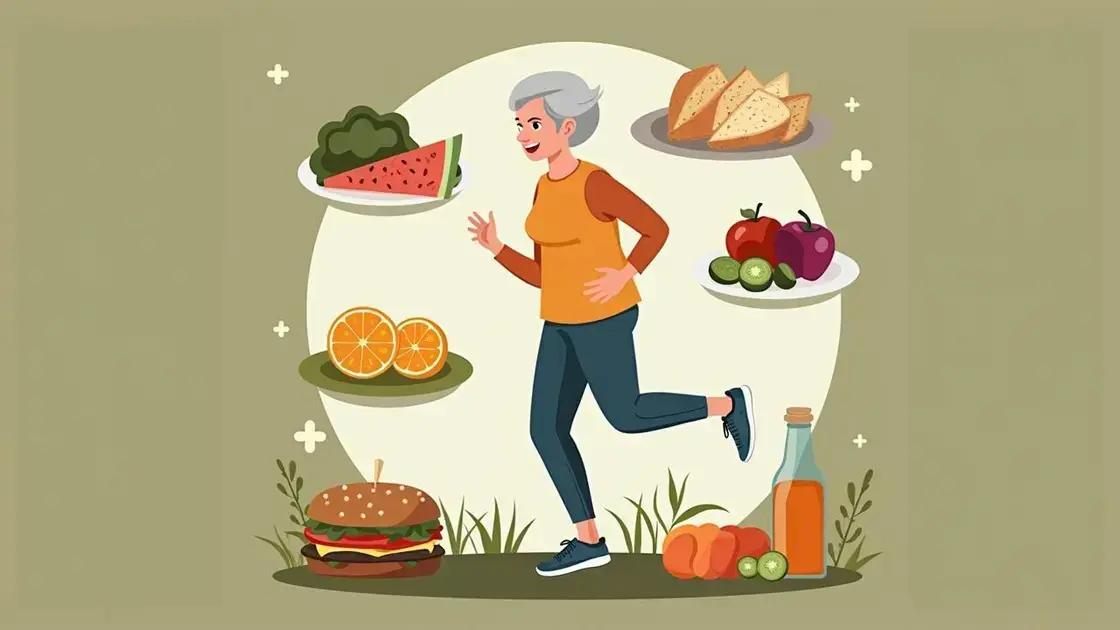Intermittent fasting is a dietary approach that alternates between eating and fasting periods, benefiting seniors by promoting weight management, improved metabolic health, enhanced brain function, and reduced inflammation, all of which contribute to healthy aging.
As we age, maintaining our health becomes increasingly important. The Role of Intermittent Fasting in Healthy Aging offers insights into how this dietary approach can enhance longevity and vitality. By adopting intermittent fasting, you may experience numerous health benefits, including weight management, improved metabolic health, and reduced risk of chronic diseases. In this article, we will explore the foundational concepts of intermittent fasting, its specific advantages for seniors, safe starting practices, and tips for effectively integrating this lifestyle into your daily routine.
Understanding Intermittent Fasting

Understanding Intermittent Fasting is essential for those seeking to improve their health and promote longevity. This dietary pattern alternates between periods of eating and fasting. Unlike traditional diets that emphasize what to eat, intermittent fasting focuses on when to eat. This method is not just a temporary weight loss strategy; it’s a lifestyle choice that can lead to various health benefits.
Types of Intermittent Fasting
There are several popular methods of intermittent fasting. The 16/8 method involves fasting for 16 hours each day and eating within an 8-hour window. Another popular approach is the 5:2 diet, where you eat normally for five days and limit calorie intake to about 500-600 calories for two days. Alternate-day fasting is another option, where you alternate between fasting and regular eating days.
How Intermittent Fasting Works
During fasting periods, your body undergoes several metabolic changes. Insulin levels drop, which can facilitate fat burning. The body also increases the release of human growth hormone (HGH), which can aid in muscle preservation. As a result, intermittent fasting can improve your resilience against various age-related diseases.
Benefits for Healthy Aging
Research indicates that intermittent fasting may help extend lifespan by reducing inflammation and oxidative stress in cells. It can also improve cognition and decrease the risk of neurological disorders. By understanding how intermittent fasting works and its benefits, individuals can make informed choices about their health.
Benefits of Intermittent Fasting for Seniors

Benefits of Intermittent Fasting for Seniors are significant and can greatly enhance the quality of life as we age. As individuals grow older, they face various health challenges, including chronic diseases. Intermittent fasting provides a natural way to combat these issues and promotes overall well-being.
Weight Management
Many seniors struggle with weight management. Intermittent fasting can help by reducing calorie intake and promoting fat loss. By allowing the body to burn stored fat for energy during fasting periods, seniors can achieve a healthier weight without the stress of extreme diets.
Improved Metabolic Health
Another critical benefit is improved metabolic health. Intermittent fasting can help lower blood sugar levels and reduce insulin resistance. These factors are essential for preventing type 2 diabetes and other metabolic disorders common in older adults.
Enhanced Brain Function
Research suggests that intermittent fasting may have protective effects on the brain. It can promote the growth of new neurons and increase levels of brain-derived neurotrophic factor (BDNF), which is crucial for learning and memory. With these benefits, seniors may experience improved cognitive function and a reduced risk of neurodegenerative diseases.
Reduced Inflammation
Chronic inflammation is linked to various aging-related diseases. Intermittent fasting has been shown to lower markers of inflammation in the body. By reducing inflammation, seniors can support their immune system and may lower the risk of conditions such as arthritis and heart disease.
How to Start Intermittent Fasting Safely

How to Start Intermittent Fasting Safely involves several key steps to ensure a positive experience. It’s important to approach fasting with care, especially for seniors or those with underlying health conditions.
Consult a Healthcare Professional
Before starting intermittent fasting, consult your doctor. They can help assess whether fasting is safe for you, especially if you have diabetes, cardiovascular issues, or other health concerns.
Choose a Method that Suits You
Select a fasting method that fits your lifestyle. The 16/8 method and the 5:2 diet are popular choices. Choose one that feels comfortable and sustainable for you.
Start Slowly
When beginning intermittent fasting, start slowly to allow your body to adjust. You could start with a shorter fasting period, such as 12 hours. Gradually increase the fasting window as you become more comfortable.
Stay Hydrated
During fasting periods, it is essential to stay hydrated. Drink plenty of water, herbal teas, or black coffee. Avoid sugary drinks as they can break your fast.
Listen to Your Body
Pay attention to how your body responds. If you feel dizzy, excessively hungry, or unwell, it is essential to break your fast and eat. Fasting should not feel like suffering.
Maintain a Balanced Diet
When you eat, focus on healthy, nutrient-dense foods. Incorporate fruits, vegetables, whole grains, and lean proteins. This will help ensure you get the nutrients your body needs.
Tips for Sustaining Your Fasting Journey

Tips for Sustaining Your Fasting Journey can help you maintain your commitment to intermittent fasting and enjoy its benefits. Here are some helpful strategies to keep you on track.
Set Realistic Goals
Begin by setting achievable goals. Understand that fasting is a journey, not a race. Gradually increase your fasting window and be patient with your progress.
Stay Accountable
Sharing your goals with friends, family, or a support group can help keep you accountable. Consider using social media or apps to connect with others on the same journey.
Plan Your Meals
Prepare your meals ahead of time to avoid impulsive eating. Focus on nutrient-dense foods and balanced meals. This planning will fuel your body during eating windows and support your health.
Keep a Journal
Document your fasting experiences. Write down how you feel, what works, and what doesn’t. Keeping a journal can help you identify patterns and maintain motivation.
Adjust as Needed
Be flexible with your fasting approach. If a method feels too challenging, don’t hesitate to modify it. The goal is to find a routine that suits your lifestyle and goals.
Stay Hydrated and Practice Mindfulness
Drinking enough water during fasting periods is essential. Also, practice mindfulness techniques, such as meditation or deep breathing, to help manage hunger and develop a healthier relationship with food.
Embracing Intermittent Fasting for a Healthier Future
Intermittent fasting offers a pathway to improved health, particularly as we age. By understanding the methods and benefits of this dietary approach, seniors can enhance their well-being and potentially increase longevity.
Starting safely with proper guidance and setting realistic goals is crucial. With the right mindset and strategies for sustaining your fasting journey, this lifestyle change can lead to significant health improvements.
Remember to listen to your body and make adjustments as needed. Intermittent fasting is not just a trend; it’s an opportunity to promote healthy aging and foster a better relationship with food.
Take the first steps towards this transformative journey, and enjoy the benefits of a healthier, more vibrant life.
FAQ – Frequently Asked Questions about Intermittent Fasting and Healthy Aging
What is intermittent fasting?
Intermittent fasting is a dietary pattern that alternates between periods of eating and fasting. It focuses on when to eat rather than what to eat.
What are the benefits of intermittent fasting for seniors?
Benefits for seniors include weight management, improved metabolic health, enhanced brain function, and reduced inflammation, which can promote longevity.
How can I start intermittent fasting safely?
Consult your healthcare professional, choose a fasting method that suits you, start slowly, and stay hydrated to ensure a safe experience.
What tips can help sustain my fasting journey?
Set realistic goals, stay accountable, plan your meals, keep a journal, adjust your approach as needed, and stay hydrated while practicing mindfulness.
Is intermittent fasting suitable for everyone?
Intermittent fasting may not be suitable for everyone, especially those with specific health conditions. Consulting a healthcare provider is recommended.
Can I drink liquids during fasting periods?
Yes, you can drink water, herbal teas, or black coffee during fasting periods. Just be sure to avoid sugary drinks that can break your fast.













